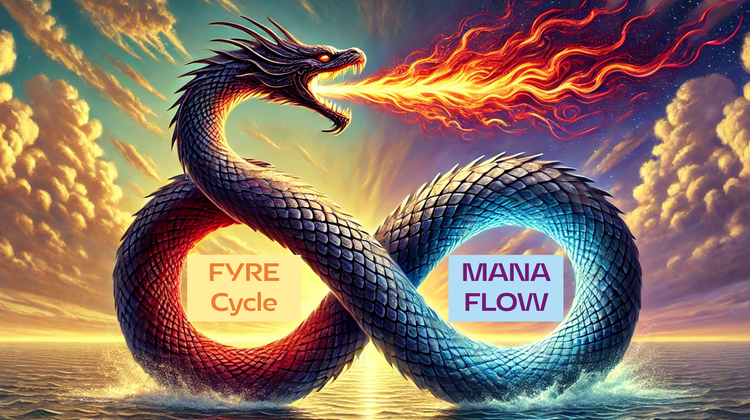Driving Economic Growth With Digital Cooperatives: The SagaHalla™ Framework

Introduction
In today's rapidly evolving economic landscape, traditional business models often fall short in meeting modern demands. As discussed in our previous posts, blockchain technology holds the promise of decentralization and transparency, streamlining processes and mitigating the need for trust across various sectors. However, the path to adoption is complicated by regulatory and technological challenges.
Blockchain developers are driving positive change, however, they still face the same long standing challenge in ptomoting open source projects: measuring and rewarding contributions fairly. By leveraging blockchain more effectively, we can create a fairer environment where contributions are recognized and rewarded transparently and according to agreed upon norms.
Digital cooperatives offer a solution that goes beyond traditional DAOs. These new structures feature decentralized real-world economic actors that align interests and build common value-driven processes within a regulated framework. SagaHalla™, powered by the SagaChain blockchain, exemplifies this approach by fostering a cooperative developer ecosystem where members actively drive value generation and utilization within a common framework.
In this post, we will explore how digital cooperatives, like SagaHalla™, can drive organizational innovation and economic development. We'll examine how these cooperatives provide a framework to accelerate the development of other digital cooperatives and facilitate interactions between members and stakeholders. We'll also look at the unique features of these cooperatives, the role of members in value creation, and their transformative potential in creating resilient and collaborative economies.
The Need for Organizational Innovation
Root Cause of Organizationsl Failure
One prinary reason organizations are set up to fail is a hierarchical and rigid structure that makes it challenging to align economic interests. Large investors seek to protect their investment by imposing strict control over the organization, leading to centralized decision-making and slow adaptation. As a result, employees feel less empowered and self-interested, becoming disillusioned quickly when opportunities become limited to grow and contribute. Stakeholders and customers likewise lose interest and move on to focus on organizations that better meet their needs.
Traditional capital funding models constrain the participation in ownership capital to investors. While founders take on significant risk and receive ownership stake in the form of stock grants and options, later employees and external stajeholders often find their ownership opportunities limited at the early stages of growth. This disparity discourages broader participation and reduces the incentives for contributors to invest their full potential into projects and concentrates capital by limiting windwall rewards to early investors and insiders. The wider community of contributors and potential investors are at a disadvantage at a IPO stage due to the investment timing of participation after early investors. This is also true for early project token launches by ICOs with heavy insider investment stakes.
Blockchain and Digital Cooperatives as a Solution
Blockchain technology offers a transformative solution by enabling decentralized funding and governance models, which can create more equitable and adaptable organizational structures. This technology allows for value generation through both financial and labor contributions, giving contributors more influence and aligning incentives more effectively.
- Decentralized Funding Models: Blockchain and Digital Cooperatives enable decentralized funding mechanisms that allow for a broad base of contributors to invest and support aligned projects from the outset, distributing ownership more evenly and ensuring that contributors have a stake in the project's success.
- Value Generation through Labor Contributions: By tokenizing labor contributions, blockchain can reward contributors to projects in the cooperative based on their efforts, not just their financial investments. This ensures that those who contribute intellectual and physical labor to a project gain ownership and influence commensurate with their contributions.
- Transparent and Automated Governance: Blockchain-based governance systems automate and enforce rules transparently. This balances the need for hierarchical control with more democratic decision-making processes, giving contributors a direct say in the direction of the cooperative.
- Balanced Influence: By reducing the disproportionate influence of investment capital, blockchain can create a more balanced ecosystem where contributors participate more broadly in value generation. This fosters a culture of collaboration, innovation, and an organically evolving hierarchy, as everyone involved has a vested interest in economic success.
In summary, organization adaptability hinges on aligning economic interests. Blockchain technology and Digital Cooperatives provide a way to encourage this alignment in a broader economy. By embracing a cooperative, approach, organizations can foster a more innovative, adaptable, and inclusive economic environment for contributors and investors.
Understanding Digital Cooperative Economies
Key Features
Digital cooperative economies offer a robust framework that goes beyond traditional DAOs. These cooperatives integrate real-world economic actors and create common value-driven processes within a regulated framework.
- Decentralized Real-World Economic Actors: Unlike traditional DAOs, decentralized cooperatives involve real-world business entities that drive value generation and utilization. This approach ensures that business contracts can be created and enforced in both the digital and real world.
- Common Value-Driven Processes: These cooperatives build shared processes that align interests among members in a compliant and collaborative way. The goal is to create a balanced ecosystem where innovation thrives from a greater pool of self-interested and motivated contributors who also have significant ownership stakes and influence.
- Regulated Framework: By integrating regulatory compliance within the decentralized structure, these cooperatives ensure that innovation thrives without compromising legal integrity. This is crucial for gaining broader acceptance and fostering sustainable growth in the real-world economy.
The SagaHalla™ Approach
SagaHalla™ aims to materialize the potential of decentralized cooperative economies. Powered by the SagaChain blockchain with multichain ambitions, SagaHalla fosters a cooperative developer ecosystem where members actively build a common digital cooperative framework available for other digital cooperatives to build upon.
- Member-Driven Value Generation: In SagaHalla™, members are not just passive participants but active contributors who shape the direction of the ecosystem. Their efforts in both financial and labor contributions are transparently recognized and rewarded.
- Integrated Regulatory Compliance: SagaHalla™ incorporates regulatory requirements within its decentralized framework, ensuring that the cooperative operates within legal boundaries while maintaining its decentralized ethos.
- Facilitation of Interactions: The cooperative structure of SagaHalla™ provides a platform for seamless interactions between members and stakeholders, fostering collaboration and innovation.
Member-Driven Value Generation
Role of Members
In SagaHalla, members and the community are the cornerstone of the ecosystem, actively participating in decision-making processes and contributing to the development of the cooperative. Their roles include:
- Active Participation in Decision-Making: Members have a direct say in the governance of SagaHalla through a real-world cooperative operating agreement whose requirements are managed by a board of directors and implemented as needed transparently and democratically by blockchain technology. This ensures that all voices are heard and that the direction of the cooperative is shaped by a diverse group of stakeholders and a balanced hierarchy to facilitate cooperative decision-making and real-world interactions.
- Contributions Towards Development: Members contribute both financially and intellectually through their efforts. Whether through contributing towards the cooperative, participating in development projects, or providing expertise and resources, every contribution is recognized and valued by the cooperative framework.
Value Generation
SagaHalla's approach to value generation is designed to ensure that all contributors benefit from their efforts. This is achieved through collaborative projects and a fair system of ownership and profit distribution:
- Collaborative Projects: Members of SagaHalla™ engage in various collaborative projects that drive the development of the ecosystem. These projects span multiple areas, including the creation of the cooperative framework, developing enhancements to SagaChain, and developing applications that address real-world problems. The value of contributions is measured at the project level, and the combined value generation and contributions of all members are accounted for by the framework to adjust capital accounts at a member level.
- Shared Ownership and Profit Distribution: Ownership within SagaHalla™ is distributed among its members based on their contributions. Contributions from financial investors and those who contribute labor or intellectual property are tracked with MANA tokens that represent ownership stakes in the cooperative. These tokens not only provide a share in the cooperative's profits but also grant voting rights, ensuring that members have a stake in both the economic and governance aspects of the ecosystem.
- Stakeholder Interactions: The medium of exchange in the cooperative economy is the FYRE community token. The value of the FYRE token represents the collective relative measure of unit value of the economy over time. It is used to interact with other economies, including the base SagaChain economy, external blockchain economies, as well as for inter-economy transactions. The cooperative works to build the value of the FYRE token over time to attract new members to the network and to establish a strong competitive position with other economies.
The SagaHalla™ Token Framework
SagaHalla recognizes that a single token cannot represent all the facets of an economy, especially given complex regulatory requirements. Consequently, a three-token framework is utilized to facilitate member-driven value generation according to the three facets identified above:
- FYRE Community Token: Used for community interactions, medium of exchange, staking rewards, and ecosystem onboarding. This token incentivizes active participation and engagement within the broader community and a means to value non-financial contributions within the cooperative.
- MANA Governance Token: Grants governance participation, membership rights, value attribution of contributions and patronage divedend rights. This token ensures that members have a say in the cooperative's decision-making processes and benefit from the ecosystem's success.
- SHLD Identity Token: Represents secure identity, access control, and acts a token container for FYRE and MANA. It is crucial for ensuring that only verified members can participate in ownership of the cooperative, maintaining the integrity and security of the ecosystem. It is also critical to attribute value generation to the right member.
By utilizing these tokens, SagaHalla ensures that all coop participants are fairly rewarded and have a stake in the cooperative's future. This token-based system aligns incentives, fosters collaboration, and drives continuous innovation and growth.
Decentralized Intermediaries: A New Approach
In the world of SagaHalla, cooperatives themselves act as a form of decentralized intermediary for members and stakeholders. These cooperatives will replace many traditional centralized intermediaries by removing transactional barriers in a common economy creating more value than the sum of its parts.
Cooperatives connect and coordinate the activities of various members and stakeholders. They provide a framework that supports the diverse needs of a distinct cooperative economy. By establishing standardized processes and protocols, cooperatives help align the interests of all participants. These processes are designed to be adaptable, allowing each cooperative to build upon them and customize them to suit their specific economic needs.
The functionality of cooperatives acting as decentralized intermediaries within the SagaHalla framework focuses on facilitating capital investment, coordination, cooperation, compliance, and accounting for value generation across the ecosystem. The governance goals of the cooperative are to establish and manage the ownership model, track value generation, and ensure compliance in shared processes.
In this envisioned world, a collection of cooperatives operates within a shared SagaHalla framework. Each cooperative leverages the base framework provided by SagaHalla, customizing it to develop processes specific to their unique economic activities. This interconnected network of cooperatives will benefit from the shared infrastructure, collaborative innovation, and decentralized approach to investment risk management.
Conclusion
Decentralized intermediaries within the SagaHalla™ framework provide a transformative approach to managing cooperative economies. By replacing traditional intermediaries and transactional barriers with shared processes and a common economy, SagaHalla™ enables cooperatives to thrive. This vision of a collaborative ecosystem empowers cooperatives to innovate, create value, and operate efficiently within a regulated and transparent framework.
In summary, the SagaHalla™ framework fosters a cooperative developer ecosystem where members actively drive value generation and utilization. By leveraging blockchain technology and decentralized intermediaries, SagaHalla™ creates a more equitable, adaptable, and innovative economic environment. This approach not only aligns the interests of all participants but also ensures sustainable growth and resilience in a rapidly evolving economic landscape.






Member discussion